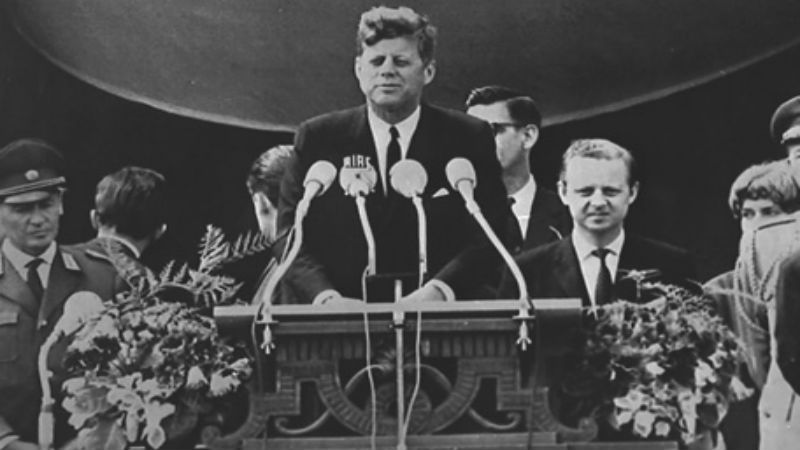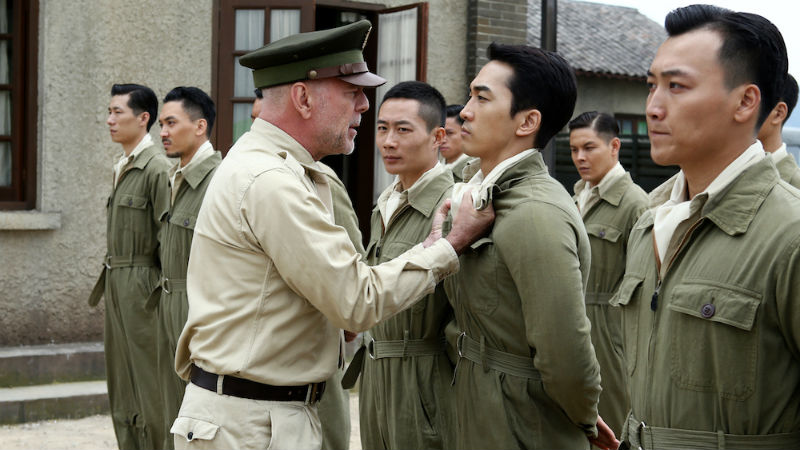




From as far back as the Tower of Babel, humans have seen language as a divisive tool. Film has worked around language barriers since the days of black and white silent reels using subtitles, dubbing and elaborate body language. But if working around a foreign tongue is such a hassle, why bother?
In many ways, the intricacy and unique nature of language adds new layers of meaning and emotion that can’t be found through a simple translation. There are phrases that just don’t work in stilted translations (think John Kennedy’s iconic “ich bin ein Berliner” for starters, pictured below) and of course the limitations placed on casting those who can only speak the main language of the film can be incredibly detrimental to the realism and intersectionality of the cast.
It is also crucial to note that there is a power dynamic here that those in the cinema industry rarely discuss: the colonial hangover of portraying ethnic minorities as speaking in stilted, broken English or, worse, presented in yellow or blackface.

.
Tongue twisters
When, as an actor, you perform your own cultural stories and your nation’s history in your first language, you can take command of what you are saying. You can speak in the rhythm and motion of your mother tongue, fully engage with the script in a way that works for you, and take back control over what you truly want to say about your country’s past, rather than parroting the words of a foreign screenwriter.
When you are working in a language that you don’t know very well, the consequences can be somewhat dire. There have been hilarious translations over the past – The Eternal Sunshine of The Spotless Mind (Michel Gondry, 2004) famously became “If you Leave me, I Delete You” in the Italian translation, and the translation for Twister (Jan De Bont, 1996) became “Run! Run! Cloudzilla!” in Chinese. And that’s just movie titles. The problem becomes far more complicated when you have to dub entire dialogues in a film. And even if you have got a really good translator on set, sometimes the poetic and personal nature of dialect and accent become lost when distributed abroad.

.
Dubbing reinvented
But if I’m going to point out a problem, I might as well point towards a solution, or at least a film that has overcome these difficulties spectacularly well. That film is Air Strike (Xiao Feng, 2018; pictured above). Or The Bombing, if we are talking about the European title. Or Unbreakable Spirit in China. It stars Bruce Willis, Adrien Brody and many Chinese actors). The film tells the story of the Japanese bombing of Chongquing in WW2, a horrific campaign that is not widely known outside of China due to the Eurocentric focus on the conflict that the West tends to take. Using American, Chinese and Japanese characters, speaking their own languages, the film manages to transform a simple war movie into an intersectional marking point in cinematic history.
With over 55 speaking roles dubbed over a four-week period, followed by six weeks of sound mixing, the task of translating the film was a mammoth one. Talent is so often blurred by an unconvincing dub, but the film’s rythmo band dubbing technique allowed Chinese star Bingbing Fan (pictured below),to appear to Western audiences as she appears to Chinese speakers, every word delivered at the same pace and rhythm as her own voice.
The “band” is actually a clear 35 mm film leader on which the dialogue is hand-written, together with numerous additional indications for the actor – including laughs, cries, length of syllables, mouth sounds, breaths, and mouth openings and closings. The rythmo band is projected in the studio and scrolls in perfect synchronization with the picture. A little bit like a teleprompter. You can see an example here.

.
Words tailored for your lips!
It’s fascinating to watch, and the success of Air Strike backs up how much it is transforming the industry. Sold to over 100 countries, the impressive dubbing was among the key factors that made it so attractive to distributive buyers. The rythmo band method allows words to be stretched, compressed or even changed to perfectly synchronise with lip movements on the screen, allowing the pace of the dialogue to flow more evenly.
But this wasn’t simply a feat of dubbing. In total, the cast and crew spoke four different languages, and working together proved to be an interesting challenge. The directors in China relied on body language and hand signals to ensure that the cast understood what was happening. You can listen to the cast and director talk through this experience here.
In a globalised world, the film industry is becoming bolder and braver with the stories we want to tell, the languages we use to tell them, and the people we cast and hire to work on them. Films like Air Strike show that we can overcome the stumbling blocks of translation and language barriers and create innovative, poignant work that challenges the borderlines of traditional storytelling.
The all-English dubbed version Air Strike (aka. The Bombing in the UK) was made available on all major VoD platforms on December 18th, after a number of controversies (including a tax evasion scandal) delayed its release. The film is considered one of the most expensive non-English language films ever made.
















